| Reviews & Columns |
|
Reviews DVD TV on DVD Blu-ray 4K UHD International DVDs In Theaters Reviews by Studio Video Games Features Collector Series DVDs Easter Egg Database Interviews DVD Talk Radio Feature Articles Columns Anime Talk DVD Savant Horror DVDs The M.O.D. Squad Art House HD Talk Silent DVD
|
DVD Talk Forum |
|
|
| Resources |
|
DVD Price Search Customer Service #'s RCE Info Links |
|
Columns
|
|
|
Natalie Wood Signature Collection
THE MOVIES:
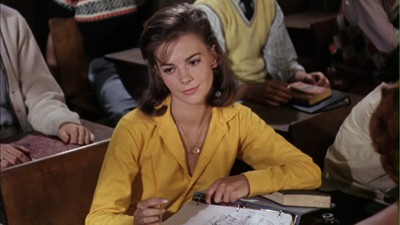
I don't remember what age I was when I first fell in love with Natalie Wood. Probably sometime in my early teens. It was when I saw Nicholas Ray's Rebel Without a Cause, when Natalie Wood and James Dean were out by the pool, laying together, their faces touching, fantasizing about the life they would have together in the future. It's still one of my all-time favorite romantic moments in cinema. It shows youthful passion tempered with innocence. They were so close to doing something, but yet they held back, just talked about the places they could go, protecting whatever chasteness remained.
I imagine this image, or something similar to it, followed Natalie Wood around for most of her career. America knew her as their little girl, watching her grow up after becoming smitten with her in Miracle on 34th Street. They always wanted her to be young and sweet. Rebel, then, must have been somewhat cathartic. It was her rebellion, too, the actress demanding to be seen as more than she was being given credit for.
I can't argue that the movies in the Natalie Wood Signature Collection allow her to shed her American sweetheart image entirely, but the six movies do seem selected to show the range she developed throughout the 1960s. She goes from playing the coquettish teenaged daughter to more conflicted teen to career girl and even an ornery child star, though with varying results. They largely represent that quintessential Natalie Wood role. Each of the young women portrayed here are struggling to assert their individualism in an adult world that either doesn't understand them or appear hell-bent on forcing them into plans other than the ones they would choose for themselves.
Too bad they couldn't force her into better vehicles, or at least force Warner Bros. to dig a little deeper into their vaults for better selections for this set. The Natalie Wood Signature Collection is not a very good boxed set, with only one bonafide out-of-the-park hit, a quartet of near misses, and one total stinker.
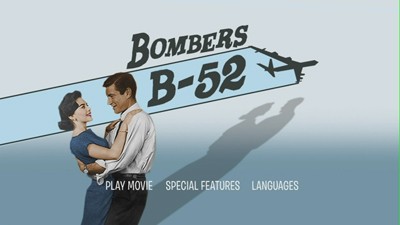
Bombers B-52 (1957; 106 minutes): This lightweight propaganda piece for the big planes didn't really offer Natalie Wood that great a part. In fact, the part of Lois Brennan is the kind of hokey teenager role that could have ended up boxing the actress in. Furthermore, she plays third fiddle to Karl Malden and Efrem Zimbalist Jr., as her father and the hotshot colonel that wants to woo her, respectively.
Make that fourth fiddle, actually. The crux of the movie is a triangle between the proud poppa, Sergeant Chuck Brennan; his new commanding officer, Col. Jim Herlihy; and more than the daughter, the planes they both love. Chuck is a mechanic who first encountered fighter pilot Joe in Korea. Thinking he is a show-off who cares more about babes and glory than the men and the mission, Chuck isn't happy to run into Joe after the war. Joe is taking over the California air base where Chuck is stationed in order to fit it for the new B-52 bombers. Chuck wants to work on these powerhouse machines, but he's not sure he wants to do it under Joe. There is a job offer waiting for him in the private sector, and his daughter Lois wants him to take it. He's thinking he will, too, since it will get her out of the clutches of Casanova Joe.
The part of the daughter could have been far meatier, especially since Lois comes to represent everything that troubles Chuck. She is the problematic future he can't control, and her harsh words about his station in life has caused him to doubt the twenty years of service he has placed all of his stock in. Yet, director Gordon Douglas (In Like Flint) is intent on spending as much time around the planes as he possibly can, and so he and writer Irving Wallace don't expend much effort developing the off-base drama. The whole scenario is rather flat and cursory, and the third act redemption story of two buddies in the field together is about as cornball as it gets. Karl Malden is great as Chuck, but the anger the character feels could almost be more the rage the actor is experiencing from having to spout such stilted dialogue. Natalie Wood is merely okay, with the cheeky moments with mom and dad falling flat and only the petulance coming across as convincing--perhaps too convincing. You may find yourself jonesing for Chuck to give Lois a good slap. Hey, at least then there'd be some believable action in this dull picture.
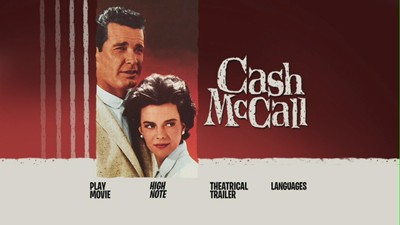
Cash McCall (1959; 102 minutes): Though billed as a romantic comedy from the writer of Executive Suite, one should not confuse this lightweight laugher with Cameron Hawley's fast moving drama. Of course, that earlier effort was adapted to the screen by Ernest Lehman and Robert Wise, and Cash McCall only gets Joseph Pevney, director of Tammy and the Bachelor, and two writers with varied resumes (Lenore Coffee wrote The End of the Affair, among others, while Marion Hargrove was mainly successful in television). The hands dealt were unequal.
James Garner is the title character, a businessman notorious for buying struggling businesses, fixing them up, and flipping them for a profit. Normally, if Cash starts looking at a company, its employees start quaking in their boots for fear of losing their jobs, but this time around, Cash has a motivated seller. Grant Austen (Dean Jagger) has been bent over a barrel by his most important client, and rather than take it, he decides to unload his plastics business and retire. Cash immediately offers him his asking price, and once he's got his hands in the company, starts to build an uber-corporation.
Cash has more than money in his sights, however, when it comes to Austen Plastics. As it turns out, he had a very brief romantic encounter with Austen's daughter, Lory, the previous summer. This affair has haunted the girl (who, of course, is played by Natalie Wood), leaving her melancholy and broken-hearted. At first, she is angry at seeing Cash again, but he woos her in the way he would close any business deal, and just as business deals get complicated, so does the lovemaking.
The flashback to the summertime meeting of Cash and Lory is probably the best example of why Cash McCall never really gets its engines running. This event is meant to be the crux of the entire story, but Pevney renders it as a bloodless, passionless embrace. Shot with the edges blurred and full of inexplicable close-ups, the flashback is like a dream half-remembered rather than an active motivator. There is no dialogue, Cash tells the story in voiceover, and so we are cut off from Lory's perspective--meaning Pevney sidesteps the enflamed desires of a young girl, the real heat of the moment. Not even the sight of a trembling, naked Natalie Wood can bail him out--particularly since Cash covers her up and sends her on her way. Is this a romance or propaganda for abstinence programs?
Pevney's direction is equally pedestrian throughout. He doesn't make much use of his widescreen framing, using mostly static shots and only really pulling out when trying to show the full group of gathered moneymen. Yawn. If I want to see that, I'll go to a banker's convention. Most of the acting is equally one-note. James Garner is all bluster, and Wood vacillates between brooding and feisty (okay, so maybe two notes, though, honestly, she is a feisty brooder, so they kind of blend). Only the always-wonderful Nina Foch gets a show-off scene. Playing the aging assistant manager of the hotel where the tycoon lives, her spurned advances, which border on the stalkerish, earn her a harsh dressing down from Cash. In response, she gets drunk and flings herself around her pink-hued apartment, hilariously stoking the fires of suspicion in the Austen clan.
I will admit, I was a little charmed by Cash McCall by the end. As a romantic comedy, it is serviceable enough that I was rooting for Lory and Cash to get it together, but the obstacle course on the way to love lacks the challenge of superior entries in this genre. Best to look elsewhere.
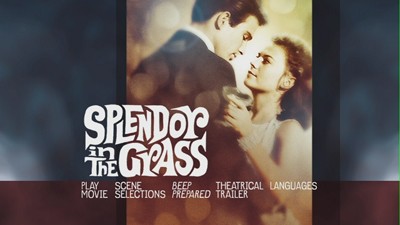
Splendor in the Grass (1961; 124 minutes): The first real gem in the set is Elia Kazan's production of Splendor in the Grass, a feverish ode to the trials of young love.
Warren Beatty made his big-screen splash as Bud Stamper, the sports star of a small Kansas High School and the son of the local oil man, Ace Stamper (Pat Hingle). Set in 1928, a year ahead of the stock market crash, Ace is making the whole town rich, and even the Loomis family has stocks in his company. Their daughter, Wilma Dean (Wood), is Bud's sweetheart. Bud and Deanie are in love and they are prone to some heavy petting, but Deanie always stops short of letting Bud go as far as he wants to go. The hormone build-up is making Bud crazy, and Deanie is conflicted, because her mother's old-fashioned take on female sexuality goes against what her own body is telling her. Representing the newer, younger ideals, there are girls like the school tramp Juanita (Jan Norris) and Bud's scandalous sister, Ginny (Barbara Loden). Both are flappers, and both represent a kind of before-and-after picture of unleashed sexuality. Juanita is growing in popularity and seemingly having a good time without consequence, whereas Ginny has been kicked out of several schools, has had an abortion, and even has a drinking problem despite Prohibition. She is no longer welcome in polite society, and Juanita is most likely heading in that same direction.
Lust and adolescent frustration ooze from every scene. Kazan uses cramped and claustrophobic framing to emphasize how trapped the young people feel, and he crams the speakers with dialogue, gathering together crowds of people where each individual member is talking over one another and drowning out the desires and protestations of his young lovers. He also uses colors to evoke mood, the drab browns and grays of Kansas life contrasting with the soft greens of nature and the lurid red of Deanie's dress. Virginia's New Year's dress is a softer color, white satin with hints of pink and silver. It looks like a nightgown, leaving her exposed when the predatory pack of males barrels down on her. Automobiles are modern dens of sin, though the main action takes place out by the falls, the cascades of water representing sexual release, be it attainable or unattainable. For Deanie, it also provides her the outlet for her Ophelia complex; Bud, then, is her Hamlet, melancholy and indecisive.
There are also Faulknerian undertones (though, there was always a bit of Shakespeare in Faulkner). Reading between the lines, there are suggestions of improprieties with Bud's sister that possibly involve her father, and even an attraction between her and Bud when he's pushed into the fatherly role. There are also issues of class and, of course, good old fashioned Southern madness.
By contrast, the film opens up as the two teens move away from each other, eventually finding happiness on brighter, more expansive landscapes. The sex the kids are not having puts a wedge between them, and they suffer from different mental maladies. In a way, screenwriter William Inge (Bus Stop) is tying a breakdown of old-fashioned values in with the Great Depression, extending a notion that some kind of cataclysmic shift is required both personally and socially for the world to turn toward a new, more progressive day. The peril of teenage sexual frustration is also a metaphor for the entire struggle of growing up, sex being just one more thing that young people can't do. Parents just don't understand how to get out of the way and let their children live their own lives. (The one exception being Deanie's father, a sweet portrait of a caring dad, played affectionately by character actor Fred Stewart.)
All of the performances in Splendor in the Grass are marvelous. Warren Beatty's tortured take on Bud would make him a star, and Natalie Wood's move from happy and hopeful to having a total nervous breakdown is achingly raw. Winona Ryder has stolen just about every move in her playbook from Natalie Wood's performance as Wilma Dean Loomis. Both of the young leads are nothing short of sensational, and Kazan backs them up with an extremely talented supporting cast. The movie is refreshingly frank for its time--and even more so for a film that takes us back to a more antiquated, supposedly more innocent period--and as a result, it still holds up. Teen angst, when done well, is timeless.

Gypsy (1962; 143 minutes): A film based on a Broadway musical based on a true story--like a game of broken telephone, something appears to have been lost along the way.
Natalie Wood stars as Louise, the gawky teen that would one day become Gypsy Rose Lee, one of the most famous strippers of all time. Pushed onto the stage early in life by her domineering mother, Rose (Rosalind Russell), Louise was always second fiddle to her cuter, blonder, and more talented sister, June (Morgan Brittany as the younger version, Ann Jillian as the teenaged version). Louise is the kind of girl who is always doing for other people, never really thinking of herself, and thanks to her mother's antics, convinced she has nothing to offer anyway. It isn't until June makes a run for it (in the play, eloping with the boy her sister has a crush on; in the movie, for some reason, eloping with a different fellow) and leaves Rose with no other options that Louise is pushed front and center--and even then, doing something unexpected. The transformation from vaudeville singer to burlesque stripper is abrupt and accidental, and then the rise of fame glossed over in a montage of performances that shows the newly dubbed Gypsy going from tentative peeler to full-fledged sensation.
I was actually surprised that so much of the movie was focused on the years of trying to make a go of it during vaudeville's death throes (you can hear some of Broadway's resentment of the movie industry seeping out in the dialogue) rather than Gypsy's later fame. I knew it was a mother-daughter story, but I had no idea that, really, this is the mother's story more than that of her daughter. It fits, though, since there is much contention about whose dream is really being served in the non-stop musical touring, that of the young girls or of their envious, attention-starved mother. Rosalind Russell, who delivered two of cinema's greatest comedic performances in The Women and His Girl Friday, proved she was just as much a force of nature several decades later with her portrayal of Rose in Gypsy. She pushes the movie along by sheer force of will, practically shoving it forward through her own undeniable physicality.
Thank God, too, because there is not much else giving Gypsy momentum. The title role is a bit of a non-starter, with Wood forced into the meek background for most of the picture, saving it all for one bravura monologue when she asserts herself at last. The supporting cast is fine, including a rock solid Karl Malden, but the production is plodding. I know that the play is considered a classic, but I didn't find any of the Jule Styne and Stephen Sondheim songs to be all that memorable (and dare I say that some of the lyrics were downright silly?). Though dance-legend Jerome Robbins choreographed the musical numbers with expected verve, Mervyn LeRoy's direction seems almost scared of getting too close to all that musical energy. He frames much of the movie in static shots taken from the middle distance or farther back, as if one were seated in a theatre watching Gypsy on a stage. Natalie Wood looks beautiful when she is finally allowed to dress up to dress down, but a near-sighted guy like me had to squint just to see her. I'm watching a movie, how the hell did I get stuck in the cheap seats? Maybe LeRoy was still shy from getting splashed on during that Esther Williams picture he directed.
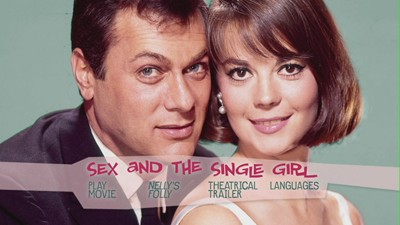
Sex and the Single Girl (1964; 114 minutes): I liked this movie better the first time I saw it back in 2004, when it was called Down With Love. I know, I know, Sex and the Single Girl was made nearly three decades before Down With Love, but it's almost like Peyton Reed saw this flick and thought, "Good idea, but done badly. I'm going to do it right!"
Natalie Wood stars as Helen Gurley Brown. Yes, the former editor of Cosmopolitan once wrote a book using herself as an example of how the unattached 1960s woman could live a full and scandalous life. If her book Sex and the Single Girl hadn't also inspired Candace Bushnell and Sex and the City, this 1964 film adaptation would be the worst thing to come out of her publishing success. As Maxwell Smart would say, "Missed it by that much."
Sex and the Single Girl is a tedious black hole that sucks all comedy into its gaping maw and leaves only a forced, feverish mess in its stead. Not even the fine cast of Natalie Wood, Tony Curtis, Lauren Bacall, and Henry Fonda could escape its suck. Hell, so far reaching was its gravitational pull, even non-Hollywood types like Count Basie and Catch-22-scribe Joseph Heller managed get caught in the vacuum--one appearing in the film, the other actually contributing to the tepid script.
In the film, Helen Brown is a doctor specializing in women's issues who has been sandbagged by Stop magazine. The cover story on her calls her sexual qualifications into question, and to prove once and for all that the sexpert is a virgin, the rag's editor, Bob Weston (Curtis), concocts an elaborate scheme to get Helen into the sack. Pretending to be his neighbor, panty-hose salesman Frank (Fonda), he unloads marital problems on Helen to try to take advantage of her puny female brain and seduce her. Forget her doctorate, she's still a lady underneath that diploma! Innuendo and mistaken identities and even a protracted car chase ensue; unfortunately, hilarity does not.
Sex and the Single Girl was directed by Richard Quine, the man responsible for the only bad movie Audrey Hepburn made in the first phase of her career, Paris When It Sizzles. That movie was a lumpen comedic deformity, and Sex and the Single Girl wades through much of the same swampy territory, right down to that car chase. The cast tries really hard, but they just can't get out from under the burden of Quine and the mishmash script. The sexy stuff isn't sexy (excepting just about everything that Fran Jeffries does in the movie; she is apparently impervious to black holes), and by today's standards, no longer scandalous; the romance is barely lukewarm; there is even a half-hearted attempt at satire regarding modern conveniences that never quite jibes with the rest of the movie. But then, why should it? No one wants to be the one guy who shows up at the nudist colony wearing a suit. What a waste of effort that would be!
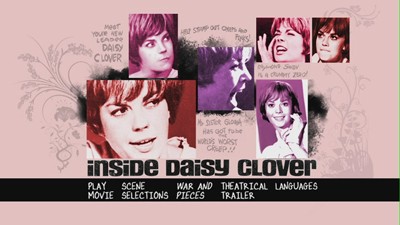
Inside Daisy Clover (1965; 128 minutes): The movie in this set that trades the most on Natalie Wood's screen persona is the self-reflexive, strange, and oft-times surreal Inside Daisy Clover, a fictional tale about a child star in the 1930s. Wood plays Daisy, a 15-year-old tomboy who lives with her senile old mother (Ruth Gordon) on the beach, selling forged autographed pictures of movie stars to passersby. Daisy is an angry, expressive young lass, prone to cigarettes, graffiti, shouts instead of whispers, and reacting to situations with her fists. She also dreams of being a singer, and she cuts a record at a fairground booth and sends it in to Swan Studios for their talent contest, thus changing her life.
Daisy is shuttled off to the movie lot in a limousine. Her mother believes it to be a hearse and warns her of accepting rides from strangers, but Daisy does not listen. She is looked over by studio head Raymond Swan (Christopher Plummer) and his wife (Katharine Bard) and given a screen test, a musical number about stardom and ambition (and the one time in the movie that Natalie Wood sings herself). Its lyrics foreshadow Daisy's oncoming success; in fact, both of the musical numbers in the movie, "You're Gonna Hear From Me" and "Circus is a Whacky World," both written by Andre and Dory Previn, work as funhouse mirrors, meta devices that break down the movie. By the time Daisy sings "Circus," she is a disillusioned star, the magic of Hollywood having been exposed to be as fraudulent as the forged photos she used to sell. Separated from her mother, married to a philandering leading man (Robert Redford) with a dirty secret, and generally turned into a cog in the machine, Daisy has been hoodwinked.
Inside Daisy Clover was made by the director/producer team of Robert Mulligan and Alan J. Pakula, who also made To Kill a Mockingbird and another Natalie Wood vehicle, Love with the Proper Stranger. As inside-Hollywood movies go, it's as savage as one might expect, the entertainment business loves to hoist itself on its own petard. In some ways, the mysterious tone of much of the back-lot action reminds me of F. Scott Fitzgerald's novel The Last Tycoon, though unlike that book or the Elia Kazan adaptation from the 1970s, or really any of the more famous moviemaking movies, Inside Daisy Clover lacks any sense of awe or wonderment in regards to how films are put together. Normally, the on-set recreations are given a tantalizing surreality, life recreated as giant spectacle. In this movie, Swan Studios--which is actually the Warners lot--is a dark and empty place. There are no huge crowds, and the few stage pieces we see are lonely and almost appear to be on their way to the junk heap, like the bizarre totem we see on a crane when Daisy first arrives. In this portrait of Hollywood, put together by writer Gavin Lambert (adapting his own novel), the heavy fugue of moviemaking is in inverse proportion to the joy the movies bring the world.
Wood spends as much time with reactions as she does action in this movie, if not more. As the center of attention, she sometimes draws more by standing back and observing. She's very good at it, her doe-eyes soaking up what everyone else is doing. They are relying on her even as they demand that she rely on them. It's an important distinction, as well, because as soon as Daisy is accepted by Swan, she stops acting on her own and starts doing what she is told--even Redford's character orders her around. In the final moments, Daisy is taking back her action. She's through taking orders.
Despite the promise and the larger issues at work here, Inside Daisy Clover doesn't entirely gel. Pakula and Mulligan are maybe trying a little too hard to be anti-everything, to be too unconventional, and the forced oddness creates a gulf between the film and its audience that is never fully traversed. Even so, it is a singular enough effort to warrant a look.
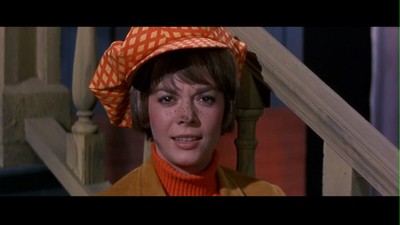
THE DVD
From what I can tell, of the six movies in the Natalie Wood Signature Collection, only Splendor in the Grass and Sex and the Single Girl were released separately. Gypsy has been available on DVD since 2000, but as a different edition, not this current remaster. The other three movies have not been released outside of this boxed set at all.
Video:
Bombers B-52 leads the set at a wide 2.35:1 aspect ratio. It has good colors, though sometimes they do look a bit washed out, and the print suffers from spotty blacks, particularly in nighttime scenes. Not a bad transfer for such a no-name picture, but not exceptional either. Gypsy is also a 2.35:1 picture, and it looks stunning. The colors are fabulously flamboyant, and the new remaster is one of this set's best. Inside Daisy Clover is almost as good, only suffering from some hazy night scenes.
Cash McCall starts off the run of films here framed at 1.85:1, and like all of them, is excellently rendered, though in this case not perfect. The colors look a little pastel-ish at times, though I think that could just be the art direction, it doesn't really look like a problem with the disc. There was only a minor amount of print damage. Nearly flawless is the new print of Splendor in the Grass, which has virtually no extraneous surface marks and is vividly rendered. Kazan's gorgeous color scheme and Boris Kaufman's wonderful cinematography both are treated with the utmost of love and respect. Likewise, Sex and the Single Girl looks exceptional.
Sound:
All of the discs in the Natalie Wood Signature Collection have their primary audio tracks mixed in Dolby mono, with the one exception being Gypsy, which has been mixed in Dolby Digital Surround. I heard nothing to complain about in any of them, they are all very conscientious soundtracks. The bigger films in particular, like Splendor in the Grass, Inside Daisy Clover, and, of course, Gypsy sound very good, with a clear delineation of the various elements of the sonic landscape.
The six DVDs all also have English subtitles for the deaf and hearing impaired and French subtitles.
Sex and the Single Girl is the one disc to deviate from the norm (excepting Gypsy's surround mix), and in addition to the same subtitle specs as the above, it also has both a Portuguese subtitle track and a Portuguese dub.
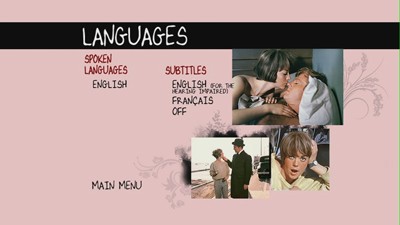
Extras:
The movies each get their own individual keepcases, and they come in a fairly sturdy box. In terms of supplemental features, they have a uniformity from disc to disc, with each movie having its theatrical trailer and a Warner Bros. cartoon, and except for Gypsy, nothing else.
The selection of cartoon to movie is picked not for theme, but for year of release, suggesting that this might be the short you would have seen preceding the main feature. The breakdown goes like this:
Bombers B-52 paired with "Boyhood Daze" (dir. Chuck Jones)
Cash McCall and "High Note" (dir. Jones)
Splendor in the Grass with the Road Runner short "Beep Prepared" (dir. Jones)
Gypsy with "The Pied Piper of Guadalupe" (dir. Friz Freleng)
Sex and the Single Girl with "Nelly's Folly" (dir. Jones)
Inside Daisy Clover with "War & Pieces," another of Chuck Jones' Road Runner cartoons.
The disc for Gypsy has two bonus songs cut from the final film, the three-way "Together Wherever We Go" with Karl Malden, Rosalind Russell (whose voice was dubbed), and Natalie Wood, as well as a duet version of "You'll Never Get Away from Me," which appears in the film with Russell singing without Malden.
FINAL THOUGHTS:
Skip It. Natalie Wood completists are going to want this set for sure, but even they are likely to admit that not every film here represents the best of the actress' oeuvre. With the only truly great film, Splendor in the Grass, being available separately, the Natalie Wood Signature Collection is too expensive and takes up too much shelf space for anyone to really need to get such a hit-and-miss package in its entirety. So, don't buy the whole thing, merely assess which ones really interest you and seek them out however you can; hopefully your local video store is renting them piecemeal. If so, Cash McCall, Gypsy, and definitely Inside Daisy Clover are worth an evening's rental, but probably don't bother with Bombers B-52 and definitely not Sex and the Single Girl. And, of course, buy Splendor in the Grass at once.
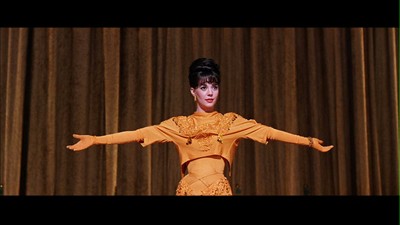
Jamie S. Rich is a novelist and comic book writer. He is best known for his collaborations with Joelle Jones, including the hardboiled crime comic book You Have Killed Me, the challenging romance 12 Reasons Why I Love Her, and the 2007 prose novel Have You Seen the Horizon Lately?, for which Jones did the cover. All three were published by Oni Press. His most recent projects include the futuristic romance A Boy and a Girl with Natalie Nourigat; Archer Coe and the Thousand Natural Shocks, a loopy crime tale drawn by Dan Christensen; and the horror miniseries Madame Frankenstein, a collaboration with Megan Levens. Follow Rich's blog at Confessions123.com.
|
| Popular Reviews |
| Sponsored Links |
|
|
| Sponsored Links |
|
|
| Release List | Reviews | Shop | Newsletter | Forum | DVD Giveaways | Blu-Ray | Advertise |
|
Copyright 2024 DVDTalk.com All Rights Reserved. Legal Info, Privacy Policy, Terms of Use,
Manage Preferences,
Your Privacy Choices | |||||||














